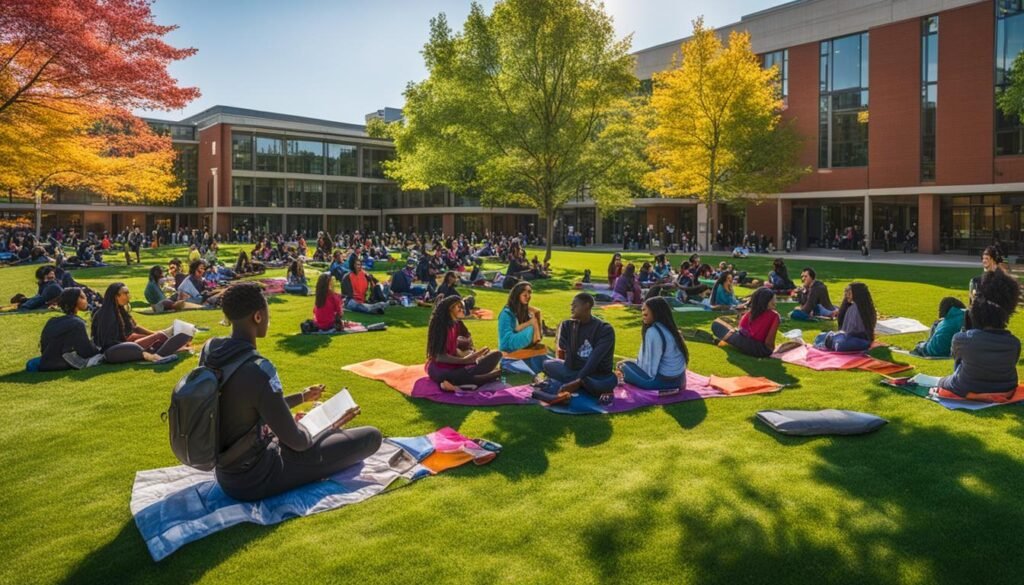In today’s fast-paced world, pursuing higher education has become increasingly important. Not only does it provide academic and career advancement, but it also offers a wide range of benefits that extend to physical and mental well-being. In this section, we will explore the physical and mental health benefits of a college degree and how it can contribute to a happier and more fulfilling life.
Key Takeaways:
- Higher education is strongly correlated with future happiness and overall life satisfaction.
- College graduates tend to have better health outcomes, more stable marriages, and longer lives.
- A college degree leads to increased earning potential and financial stability.
- College campuses provide a supportive environment for physical and mental well-being.
- The college experience fosters personal growth, a sense of purpose, and enhanced identity.
Increased Earnings and Financial Stability

One of the most compelling reasons to pursue higher education is the potential for increased earnings and financial stability. Individuals with a college degree have the opportunity to earn, on average, $30,000 more a year than those with only a high school diploma. This wage premium is a result of the knowledge and skills gained during the college experience, which are highly valued in the job market.
Not only do college graduates have the potential to earn more money, but they also enjoy greater job security. The unemployment rate for college graduates is generally lower compared to high school graduates, providing a level of stability and peace of mind. Higher education equips individuals with the qualifications and expertise necessary to excel in their chosen careers, making them more desirable to employers.
“A college degree is an investment in your future financial stability. It opens doors to higher-paying job opportunities and provides a competitive edge in the job market.”
In addition to earning potential and job security, college graduates have access to valuable alumni networks. These networks consist of successful professionals who have graduated from the same institution and can offer guidance, mentorship, and potential job opportunities. The connections made through alumni networks can significantly enhance career prospects and open doors to new possibilities.
The Importance of Graduate Outcomes and Alumni Networks
- Higher education leads to increased earnings and financial stability
- College graduates enjoy greater job security and lower unemployment rates
- Alumni networks provide valuable career opportunities and connections
Improved Health and Wellness
Higher education not only provides intellectual growth and career opportunities but also has a positive impact on physical and mental well-being. College campuses offer a supportive and healthy environment that promotes overall wellness. From state-of-the-art fitness centers to mental health services, students have access to resources that contribute to a healthy lifestyle.
Participating in extracurricular activities further enhances students’ well-being. Engaging in sports, clubs, and other activities allows students to stay physically active and develop a strong sense of community. These activities also provide a much-needed break from academic stress, promoting mental well-being and reducing the risk of burnout.
Research has shown that students who are involved in extracurriculars have better time management skills, higher self-esteem, and reduced levels of anxiety and depression. By prioritizing their health and wellness, college students are better equipped to handle the challenges and demands of academic life.
Enhanced Personal Growth and Purpose

One of the most remarkable aspects of the college experience is the unparalleled opportunity it provides for personal growth and self-discovery. From the moment students step foot on campus, they are exposed to a myriad of diverse perspectives, ideas, and experiences that can shape and broaden their horizons. The college environment fosters intellectual curiosity, critical thinking, and problem-solving skills, enabling students to develop a stronger sense of purpose and identity.
At college, students are encouraged to step out of their comfort zones and embrace new challenges. Whether it’s participating in lively class discussions, engaging in research projects, or taking on leadership roles in student organizations, these experiences push students to discover their strengths, passions, and values. This transformative process prepares them to navigate the complexities of the world beyond academia and equips them with the confidence to make informed decisions and contribute positively to society.
Campus Environment
The campus environment plays a crucial role in facilitating personal growth and purpose. Colleges often provide a supportive space where students can explore their interests and forge meaningful connections with like-minded individuals. The rich tapestry of campus life offers a multitude of opportunities for engagement, including clubs, sports teams, and cultural organizations. These extracurricular activities not only foster personal development but also encourage students to form lasting friendships and expand their network of support.
Moreover, the college experience encourages students to think critically about their values and beliefs, challenging them to examine their preconceived notions and develop a well-rounded perspective. Exposure to diverse cultures, ideologies, and ways of life can foster empathy, tolerance, and a deeper appreciation for the interconnectedness of the world. By broadening their worldview, college students gain a heightened sense of purpose and a commitment to making a positive impact on their communities.
Summing it up
The college journey is not just about acquiring knowledge and skills for future careers; it is a transformative experience that shapes individuals into well-rounded, purpose-driven individuals. Through exposure to new ideas, challenging experiences, and a supportive campus environment, students embark on a path of personal growth, self-discovery, and empowerment. The college experience equips them with the tools they need to navigate the complexities of life, fostering a sense of purpose, identity, and a commitment to making a difference in the world.
Increased Social Connections and Networking
One of the key benefits of the college experience is the opportunity to build meaningful social connections and expand one’s network. College campuses provide a vibrant and diverse environment where students can engage with their peers, participate in various activities, and form lasting friendships. Living in dorms allows students to interact with individuals from different backgrounds and cultures, fostering a sense of inclusivity and community.
Joining clubs and organizations is another way for students to connect with like-minded individuals who share similar interests. These groups offer a platform for collaboration, personal growth, and the development of valuable skills. Engaging in extracurricular activities not only enhances the college experience but also helps students expand their networks beyond the classroom.
Furthermore, colleges often provide resources and support systems that facilitate networking opportunities. Alumni networks play a crucial role in connecting current students with successful graduates who can offer guidance, mentorship, and even potential job opportunities. Attending alumni events and networking functions allows students to tap into a vast network of professionals in their desired fields, enabling them to establish valuable connections for their future careers.
Expanded Career Opportunities and Job Satisfaction
Pursuing a college degree opens up a world of possibilities when it comes to career opportunities. Graduates with higher education credentials are more likely to have a wider range of job options available to them. Many professions today require at least a bachelor’s degree for entry-level positions, making higher education essential for those looking to pursue their dream careers.
Not only does a college degree increase the number of job opportunities available, but it also enhances job satisfaction. Research has shown that individuals with higher education levels tend to have higher job satisfaction compared to those with only a high school diploma. This is because higher education provides students with the knowledge, skills, and credentials necessary to succeed in their chosen fields, leading to greater fulfillment and a sense of purpose in their work.
Another advantage of obtaining a college degree is the access to alumni networks. These networks consist of graduates who have successfully navigated their careers and are often willing to lend a helping hand to fellow alumni. Building connections through alumni networks can provide valuable career advice, mentorship opportunities, and even job referrals. This network of professionals who have gone through similar experiences can be a valuable resource for graduates looking to advance their careers.
Greater Sense of Empowerment and Personal Agency

Attending college not only provides students with academic knowledge and skills, but it also fosters a greater sense of empowerment and personal agency. Through the college experience, students gain the confidence and abilities to navigate the world and make informed decisions about their future. This empowerment comes from acquiring knowledge in various fields of study, engaging in critical thinking and problem-solving exercises, and embracing leadership opportunities.
Colleges understand the importance of empowering their students and often provide resources and support systems to enhance their personal growth. These resources can include career counseling services, mentorship programs, and leadership development workshops. By offering these services, colleges enable students to take control of their own educational journeys and shape their futures.
Additionally, the campus environment plays a crucial role in fostering a sense of empowerment. College campuses are vibrant and diverse communities where students are encouraged to express their ideas, engage in open discussions, and challenge established norms. This inclusive environment creates an atmosphere where students feel empowered to voice their opinions and explore their passions.
Supportive Alumni Networks
Furthermore, the presence of strong alumni networks further contributes to the sense of empowerment and personal agency among college students. Alumni networks connect current students with successful professionals who have graduated from the same institution. These networks serve as valuable resources for mentoring, networking, and career advancement opportunities.
Alumni can provide guidance, share their experiences, and offer insights into various industries and career paths. By tapping into these networks, students gain access to a wealth of knowledge and can develop professional connections that can propel their careers forward.
In conclusion, the college experience not only imparts academic knowledge but also empowers students to become confident, capable individuals. Through a combination of educational resources, a supportive campus environment, and connections to alumni networks, students are equipped with the tools they need to thrive personally and professionally. This sense of empowerment and personal agency ultimately contributes to their overall happiness and success.
Conclusion
Pursuing a college degree offers a wide range of benefits that go beyond academic and career advancement. One of the significant advantages is the positive impact it has on both physical and mental health. Research has shown that individuals with higher education levels tend to have better overall well-being and happiness.
In addition to improved health, obtaining a college degree also leads to increased earnings and financial stability. On average, college graduates earn $30,000 more per year than those with only a high school diploma. This financial security contributes to a sense of stability and overall happiness.
Furthermore, a college education promotes personal growth and purpose. Students are exposed to diverse perspectives, challenging them to think critically and develop problem-solving skills. This development can lead to a stronger sense of identity and increased happiness in life.
Moreover, pursuing a college degree offers opportunities to build social connections and expand networks. College campuses provide an environment that fosters social interactions through various activities, clubs, and organizations. These connections not only lead to lifelong friendships but also open doors for professional networking opportunities and career advancement.
In conclusion, while college may not be the right path for everyone, it offers numerous physical and mental health benefits. The potential for increased earnings, personal growth, enhanced social connections, and expanded career opportunities are all compelling reasons to consider pursuing a college degree. Ultimately, the decision to pursue higher education can contribute to a happier and more fulfilling life.
FAQ
Does having a college degree really make you happier?
Research suggests that there is a strong correlation between education and happiness. In a survey, 94% of people with a bachelor’s degree or more reported feeling happy or very happy with their lives overall.
Can a college degree lead to higher earnings?
On average, individuals with a college degree make $30,000 more a year than those with only a high school diploma. Higher education also leads to greater job security, as college graduates have a lower unemployment rate compared to high school graduates.
How does college education contribute to better health outcomes?
College campuses often offer a supportive and healthy environment, with resources such as fitness centers and mental health services. Participating in extracurricular activities can also contribute to better physical and mental well-being.
Does college help with personal growth and self-discovery?
Yes, college provides a unique opportunity for personal growth and self-discovery. Students are exposed to diverse perspectives, ideas, and experiences, which can broaden their horizons and help them develop a sense of purpose.
Can attending college help me expand my social connections?
Absolutely! College offers a multitude of social opportunities, allowing students to build meaningful relationships and expand their networks. The college experience fosters social connections through activities such as living in dorms, joining clubs and organizations, and participating in campus events.
How does a college degree impact career opportunities?
A college degree opens doors to a wider range of career opportunities and positions. Many professions require at least a bachelor’s degree for entry-level positions. Higher education provides students with the knowledge, skills, and credentials necessary to succeed in their chosen career paths.
Can college education empower individuals?
Yes, college education empowers individuals and fosters a sense of personal agency. By acquiring knowledge and skills, students gain the confidence to navigate the world and make informed decisions. Colleges often provide resources and support systems that help students develop critical thinking, leadership, and problem-solving abilities.
What are the overall benefits of pursuing a college degree?
Pursuing a college degree offers numerous benefits beyond just academic and career advancement. It positively impacts physical and mental health, increases earnings and financial stability, enhances personal growth and purpose, improves social connections and networking, and expands career opportunities.


